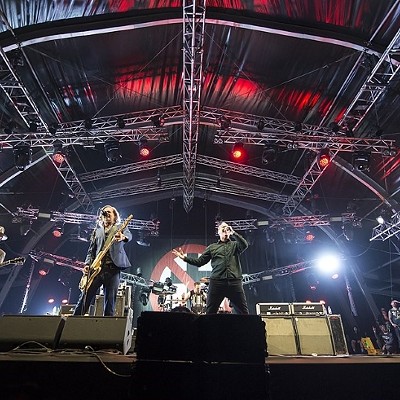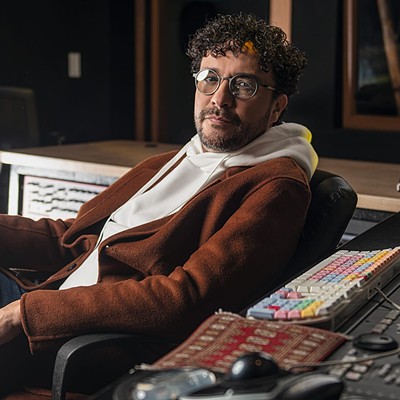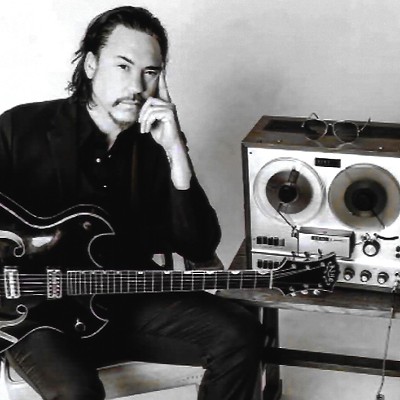"We were little pricks, but bored out of our minds..."
For 30 years, seminal Orange County punk band the Adolescents has unleashed anthemic teen angst, since mutated into wise adult aggravation, in intermittent bursts. Sure, members come and go at revolving-door speed, but core kids from the black hole Steve Soto (bass) and Tony Cadena (vocals) remain at the helm.
They keep offering each new generation a chance to sing along to tunes from their self-titled 'blue album' onwards that evoke the confusing world of politics, science and everyday struggles to survive as loners and outcasts.
Rocks Off: The ties between the Adolescents, Agent Orange and Social Distortion are well-known, but how did the band feel about Middle Class and Red Kross?
Steve Soto: One of the first bands we met when I was in Agent Orange was Red Kross. We used to have to hang out in front of the Hong Kong Café depending on who was working the door. Some of the staff were more lenient about our age than others. Anyway, when we (AO) first started playing in Hollywood, we were the youngest band, then we met Steve McDonald, and he was all of 12 years old (we were 15), so we lost our youngest band status.
I was a huge fan of Red Kross and began a friendship with then-guitarist Greg Hetson that continues to this day. In fact, we play in a band together called Punk Rock Karaoke. Anyway, somewhere in my tape collection I have a cassette Greg made me of their first recordings, some of which would turn up later on Poshboy. I think I wore that tape out.
The Middle Class were a bit older than us, but I used to really look up to them. They had played Hollywood and had put out the "Out of Vogue" single before we had even played our first party. Their bass player Mike Patton got Agent Orange our first show in L.A. opening up for the Middle Class. This was before there were any punk clubs in Orange County.
The "Out of Vogue" 7 inch is still one of my favorites to this day, and they were a huge influence on my writing. Up until this point, everything was a lot slower - compare "Never Mind the Bullocks" or The Dead Boys' "Young Loud and Snotty" to "Out of Vogue." Those records are great but soooo slow.
Middle Class picked up the pace. It was exciting. I still get chills listening to that song.
RO: The Adolescents gigged with Black Flag. Did you feel that the SST crew pursued a self-interested, business-like approach?
SS: I have a ton of issues with the Black Flag camp. First of all, in hindsight, they were really out for themselves. We got along okay, but looking back as an older and wiser musician, I feel like we were used by those guys.
We had this huge following of suburban O.C. kids who went wherever we played, and the Flag guys used to put us on a lot of shows, yet we never really made any money when we played with them. I think it was a case of us not knowing what we were worth. We loved playing with them because of the early stuff (Nervous Breakdown and Jealous Again EPs), so we never thought about it. We thought they were cool.
Like I said in hindsight, they could have been more fair with us, but as they got further along with Henry [Rollins], they lost it for me, and they just got weirder. I think a lot of the early bands were into the "scene " and into playing shows and helping each other (like with us, the Circle Jerks, TSOL, the Middle Class, the Crowd), but Black Flag seemed to clearly have an agenda.
RO: "Kids of the Black Hole" is a punk rock Bob Dylan-sized narrative song, in striking contrast to two-minute songs from the Circle Jerks and Black Flag. Did late-period Buzzcocks influence this?
SS: I remember the exact time and place where Rikk [former guitarist Agnew] first played me that song. He had recorded the rhythm guitar and the bass on a cassette then played the second guitar along with the tape. I was blown away. It's probably still my favorite song to play live. The lyrics are awesome and all true.Tony stepped in a bit with those, but musically, yeah, there is a definite Buzzcocks thing going on there.
RO: Were Fullerton Punks partly responsible for the types of violence that escalated at places like the infamous Starwood? Is the media partly to blame for the mythos of violence?
SS: The Fullerton punks were never a tough bunch, and we steered clear of the whole violent end of the scene. It was no myth. There was definitely a "thug" element that reared its head sometime during 1980.
The Fleetwood in Redondo was a rough place. I can see where that bummed out some of the older bands. It bummed us out too. Tony used to stop songs if it got too out of hand. It was weird. It used to flare up here and there, and then the media picked up on it and there was an article by Pat Goldstein of the L.A. Times, and then that seemed to open the floodgates to a ton of jock assholes who came to kick ass and could give a fuck about the music
RO: Singer Tony told me songs like "Wrecking Crew" were about "tearing down the existing social order of 1979-80... teen angst, high school style. The song is more an anthem to survival... more like Peter Pan than Lord of the Flies."
SS: "Wrecking Crew" in particular had nothing to do with punk-on-punk violence. The title and intro and first verse were mine, and they were inspired by teenage vandalism me and some friends (including a very paranoid Frank Agnew and Agent Orange Drummer Scott Miller, who was most likely the chief instigator) went on a spree of destruction, including lighting fire to all the trash cans on a street and watching them burn, slashing tires etc. All good clean teenage fun.
No, actually we were little pricks, but bored out of our minds. Anyway, that was why that song started as, "There's nothing to do..." So let's wreck shit, create a bit of havoc in the neighborhood. We hated "punk on punk violence."
That's what "Rip it Up" was about, but we Fullerton boys never actively started any kind of "punk protection" gang, although at some point there got to be so many of us they had to leave us alone. But the whole tough guy thing never was cool with us. We just wanted to get girls, get drunk, have fun.
RO: The symbolic Black Hole -- Tony's name for Mike Ness of Social Distortion's apartment -- was a place of punk-fueled abandon and dark nights. Has America changed much from then?
SS: Those were different times, before AIDS and Hepatitis C. There was rampant drug use, alcohol abuse and casual sex. It was so normal. Eddie [manager of the Adolescents] would give me speed to sell at high school. That, at the time, seemed acceptable. He was a 30-year-old man. You think he should have known better.
I don't know. It all seemed so normal back then. America was just starting to get more conservative. We were just the last to sign on. I mean that was when Reagan was in the White House and the Moral Majority was on the rise. It was the end of the '70s and the dawn of the new conservatism, but we were teenage kids totally out of step with the American dream.
We wanted to have fun. There was nothing exciting about going to college and then to work at Rockwell or IBM or whatever. It didn't seem like anything we wanted to rush into.
RO: Tony also wrote me that Robbie Fields (Posh Boy) and his engineer "were absolutely dreadful to work with." Is that how you remember the Posh Boy affair?
SS: There is a quote that Robbie put on the 7" where I was saying that they tried to make us sound disco and that the engineer was a dick (this was concerning the "Amoeba" recording). I got drunk fairly early on, so my memory is a bit shady on the whole thing. It wasn't the most comfortable experience I had ever had recording...
RO: Are fans to assume that Complete Demos is the definitive leftover material from the early Adolescents?
SS: For all I know, the bottom of the barrel has been scraped.
RO: Tony is a huge fan of Cheap Trick and wanted the Blue Album's typesetting to look like Cheap Trick, but Frontier wanted it to look like "generic supermarket packaging"?
SS: Tony and I are both huge Cheap Trick fans. Unfortunately, I have no recollection of the artwork part of the record other than most of the photos were taken by my friend Jeri.
RO: By the time of songs like "The Liar" (co-written by you), had the band's ideas shifted from mostly biographical to socio-political commentary?
SS: By the time we started writing the songs for "Brats..." we were six years into the quagmire known as the Reagan administration. It was bound to have some influence on what we were writing. We always went our own way. It wasn't like, "Let's be political like the DKs."
RO: Looking back, how do you feel about "Balboa Fun Zone"?
SS: It was a mistake. We should have used another name. At the time, I think we just dreaded the idea of starting over, so we got lazy and took the easier road out.
The Adolescents play with Lower Class Brats, Born Liars and The American Heist, 8 p.m. Saturday, January 1, at Walter's on Washington, 713-862-2513.





